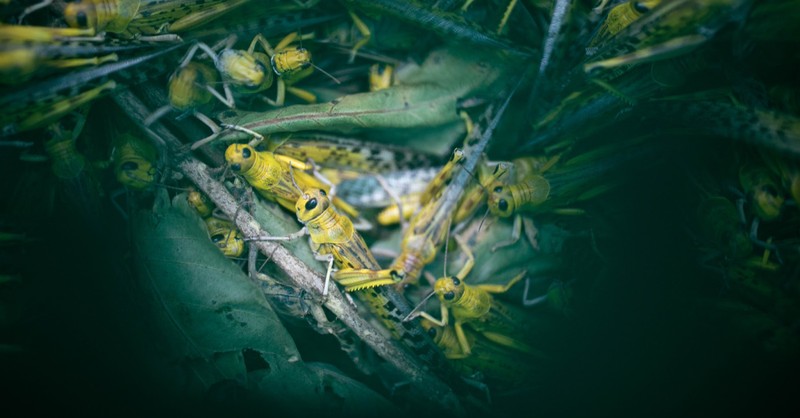What Do Locusts Represent in the Bible and in the End Times?
- Betty Dunn Contributing Writer
- Updated Mar 02, 2021

There are over 30 mentions of locusts in the Bible, in 17 Old and New Testament books. Bible passages with detailed images of locusts and historical accounts of locusts’ devastation to crops are found in Exodus, Psalms, Jeremiah, Joel, and Revelation.
One memorable mention of locusts in the Bible is a terrifying metaphor, we hope, found in Revelation, in which a menacing army is described as a huge swarm of locusts. “And he opened the bottomless pit; and there arose a smoke out of the pit, as the smoke of a great furnace; and the sun and the air were darkened by reason of the smoke of the pit. And there came out of the smoke locusts upon the earth: and unto them was given power, as the scorpions of the earth have power. And it was commanded them that they should not hurt the grass of the earth, neither any green thing, neither any tree; but only those men which have not the seal of God in their foreheads. And to them it was given that they should not kill them, but that they should be tormented five months: and their torment was as the torment of a scorpion, when he striketh a man. And in those days shall men seek death and shall not find it; and shall desire to die, and death shall flee from them. And the shapes of the locusts were like unto horses prepared unto battle; and on their heads were as it were crowns like gold, and their faces were as the faces of men. And they had hair as the hair of women, and their teeth were as the teeth of lions. And they had breastplates, as it were breastplates of iron; and the sound of their wings was as the sound of chariots of many horses running to battle. And they had tails like unto scorpions, and there were stings in their tails: and their power was to hurt men five months” Revelation 9:2-10 (KJV).
This is indeed a frightening “woe to the inhabitants of the earth” in a prophecy of the end times (Revelation 8:13b KJV).
What Are Locusts in the Bible?
A locust is a special kind of grasshopper that adapts its body and behavior to swarm when environmental conditions are right—usually when there's a lot of rainfall. Then their remarkable transformation in brain, color, size, and attraction to one another draws them into swarms damaging crops over wide areas of land.
A frightening fact about locusts is a 10 to 16-fold increase in locust numbers occurs from one generation to the next. African countries are now experiencing their worst infestations of locusts in decades. Desert locusts in Africa and Asia swarm with as many as 150 million locusts per square kilometer and fly in the direction of the prevailing wind. They may travel up to 150 kilometers in one day. A very small, one-kilometer locust swarm can eat the same amount of food in a day as about 35,000 people. Pesticides and biological control measures have some effect on controlling populations. Locusts live up to one year without population control.
The closest I have ever been to a swarm of locusts was at a Tiger baseball game, in a year there was an infestation of cicadas, a flying insect like a locust. I remember swatting at the large, chirping creatures circling in flight above the bleachers.
Where Are Locusts Found in the Bible?
Probably the most familiar Biblical description of locusts is found in Exodus. When Moses asks Pharaoh to “Let my people go” (Exodus 10:3b)—let the Israelites leave their miserable bondage in Egypt—and Pharaoh doesn’t respond, God takes over by releasing ten plagues on Egypt. The eighth plague is a locust attack.
The plagues are designed by God to display his power, “. . . that you may know that I am the Lord” (Exodus 10:2b) and convince Pharaoh to listen to Moses’ request. The plague of locusts comes between the plague of hail, which flattens important ancient Egyptian crop plants like flax and barley, and the plague of darkness, which makes the bare earth even more desolate. Moses warns the Egyptian leaders in advance of the eighth plague:
“If you refuse to let them go, I will bring locusts into your country tomorrow. They will cover the face of the ground so that it cannot be seen. They will devour what little you have left after the hail, including everything that is growing in your fields. They will fill your houses and those of all your officials and all the Egyptians—something neither you nor your forefathers have ever seen from the day they settled in this land till now” Exodus 10: 4-6.
A locust invasion is a death sentence for the people of Egypt, an agrarian society that depended on their crops and trees for survival. They would and did experience famine without their crops’ produce. Locusts may also have invaded homes and eaten wooden furniture and building structures, as Moses mentions. The damage locust did in Egypt was nothing short of brutal.
With this ancient plague part of the common history of the ancient Bible world, the ”weeping prophet” Jeremiah uses images of locusts in his warnings to the straying Israelites. In Jeremiah, a locust attack is a metaphor for a rival tribe’s attack. “They will chop down her forest,” declares the Lord, “dense though it be. They are more numerous than locusts, they cannot be counted” (Jeremiah 46:23). Like a locust invasion, Jeremiah prophesies that an army with come to destroy the Israelites. “The Lord Almighty has sworn by himself: I will surely fill you with troops, as with a swarm of locusts, and they will shout in triumph over you” (Jeremiah 51:14).
The benign Gospel description of locusts is very different from the Old Testament and Revelation’s images of locusts as soldiers ready to attack. In the refreshing world of the New Testament gospels, John the Baptist ate locusts and wild honey. He was a natural man living in the wilderness by himself. Eating locusts, rich in protein and other beneficial nutrients, sustained him in his ministry of preparing the way for a Savior of the people. The metaphor of locusts as a terrifying, life-destroying force changes to a life-giving source of nourishment in Matthew 3:4 and Mark 1:6. The locust diet of John the Baptist is also in accordance with Jewish law recorded in Leviticus 11:22. This section of Mosaic Law gives ancient Hebrews permission to dine on large insects, including locusts.
What Do Locusts Represent in the Bible?
Due to their incredible ability to destroy crops and property, swarms of locusts are used as a symbol of evil forces throughout the Bible. Clearly, Old Testament locust outbreaks and attacks on people’s property represent destruction and devastation. In a more hopeful vein, the second chapter of Joel poetically describes an attack by an army of soldiers in imagery like that found in Revelation and Jeremiah, where an apocalyptic world is invaded by an army of soldiers who look like locusts. Yet there is a promise of relief from the bad times brought on by locusts in Joel 2:25: “I will give back to you the years that the locust has eaten.” If locust outbreaks represent bad times, either societal or personal, this verse gives us hope. A bad time, for example, a period with a depressed mood, a job loss, or a bad relationship, will end and our spirit will be restored according to Joel 2:25. God speaks through the prophet Joel with a promise to “give back” happiness. There are many good years of farming, of living when the locusts won’t swarm.
Besides representing a sudden stroke of bad luck, a locust outbreak may represent the frustration of loss after much personal effort, the futility of working without God’s blessing. In a lengthy, Old Testament warning listing curses for the Israelites’ disobedience to God, the Bible says, “You will sow much seed in the field but you will harvest little, because locusts will devour it” (Deuteronomy 28:38). Psalm 105:34-35 outlines the heartache of the eighth Egyptian plague before the Israelites’ exodus: “(God) spoke and the locusts came, grasshoppers without number; they ate up every green thing in their land, ate up the produce of their soil.”
In a different context, a Bible passage scorns ancient Nineveh’s materialistic culture, with evil entrepreneurs who swarm like locusts, consuming people’s interests and fortune: “You have increased the number of your merchants till they are more numerous than the stars in the sky, but like locusts they strip the land and then fly away” (Nahum 3:16).
A plague, a largescale, adverse event such as a locust attack, is also evidence of God’s power manifest in nature. There is much chaos in God’s creation. Locust outbreaks are one of the many elements of nature beyond human control. Winds send locusts on widespread, swirling flights. Locusts can’t even control their own direction or distance. God’s power represented by locusts is awesome and unknowable to people. Pesticides put a dent in locusts’ number, but nothing totally stops the path of their destruction.
What Do These Insects Mean for the End Times?
Old Testament plagues take new forms in the 21st century. The COVID pandemic has the characteristics of a plague. Instead of swarming locusts destroying crops, an infectious disease attacks our bodies and has killed over 300,00,000 people on earth as of early 2021.
Health and environmental crises require us to diligently care for ourselves and our aging planet. The book of Revelation graphically depicts health and environmental devastation in the end times: boils on people, waters turning to blood, drought, darkness, a global earthquake . . . In an article titled “Apocalypse Now: Floods, Tornadoes, Locusts: Is violent weather around the globe a sign of a coming Apocalypse?” by Susan Donaldson James for ABC News (2008), she writes, “God's wrath seems at work these days, as the heavens and Earth have unleashed earthquakes in China, a cyclone in Burma, killer tornadoes and record floods across the U.S. and even a plague of locusts (cicadas) in New England. The article “Apocalypse Now” claims that “Though tsunamis, hurricanes and heat waves may not be a punishment from God, history teaches that events in the physical world trigger upheaval in society. Civilizations have risen and fallen over drought, famine, and water wars.”
Stephen B. Chapman, an associate professor of the Old Testament at Duke University Divinity School, comments in the “Apocalypse” article: “. . . the Bible has a lot to say about man's relationship to the eco-system. In the Bible there is an essential relationship between social justice and right worship and ecology," said Chapman. "The Bible has an intense interest in ecology. Religious scholars are beginning to pay more attention to what the Bible has to say about man's destruction of the environment and its relationship to natural catastrophes.”
One likely, looming catastrophe is that increased rainfall and moisture resulting from global warming will create conditions in which insects such as locusts thrive.
Why Is This Important for Christians to Know?
Evil hearts swarming together harm a body of believers’ spirituality. A swarm of locusts is hard to ignore once it’s causing damage, but its development is easier to nip in the bud. Our faith is a kind of biological control, like using fungus to destroy locusts’ bodies. It is possible that through God’s grace and our care for His creation we will be given back the years the locusts have eaten. Our soul, spirit, and earth may be restored.
Solomon uses locust imagery when he prays at his temple dedication:
“When famine or plague comes to the land, or blight or mildew, locusts or grasshoppers, or when an enemy besieges them in any of their cities, whatever disaster or disease may come, and when a prayer or plea is made by anyone among your people Israel—being aware of the afflictions of their own hearts, and spreading out their hands toward this temple—then hear from heaven, your dwelling place. Forgive and act; deal with everyone according to all they do, since you know their hearts (for you alone know every human heart), so that they will fear you all the time they live in the land you gave our ancestors” I Kings 8:37-40.
Photo credit: ©Getty Images/Luke Dray/Stringer




















